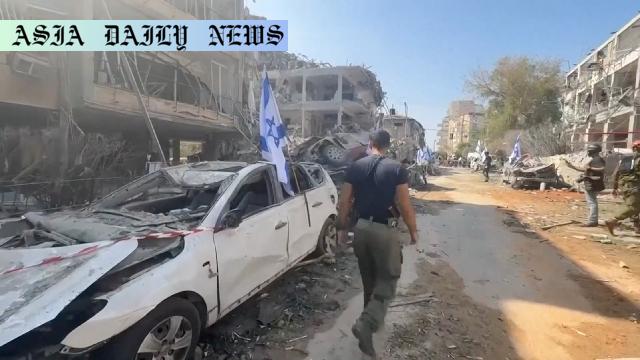Israel-Iran Conflict: Hostilities between Israel and Iran intensified as military strikes and retaliation rocked the Middle East.
- Hostilities between Israel and Iran have escalated, disrupting nuclear talks with the US.
- Iranian and Israeli airstrikes have resulted in significant casualties on both sides.
- Diplomatic efforts for peace are hindered due to ongoing violence and retaliatory attacks.

Escalation of the Israel-Iran Conflict
The Middle East has once again been thrust into turmoil as hostilities between Israel and Iran have escalated over the past few days. Violence erupted after Israeli forces conducted targeted strikes on Iranian facilities, reportedly killing 78 individuals, including prominent military leaders. While such strikes have become routine, the scale and intensity of this wave have deviated significantly, leaving much of the global community alarmed.
Iran swiftly retaliated by launching ballistic missiles and drones toward Israeli targets. This counteraction, which allegedly claimed the lives of three individuals and injured more than 70 others in Israel, signifies the deepening impasse between these long-standing adversaries. Tensions have permeated the air in the region, with both countries locked in a pattern of attack and counterattack that shows no signs of abating. This eruption of violence has also coincided with critical diplomatic negotiations regarding Iran’s nuclear program, placing immense strain on international hopes for peace and stability.
Impact on Nuclear Negotiations
The escalation of violence has notably disrupted scheduled talks between Iran and the United States regarding Tehran’s nuclear program. A meeting initially set to take place on Sunday was abruptly canceled following Iranian Foreign Minister Abbas Araghchi’s public condemnation of Israeli attacks. In an environment rife with hostility and distrust, the foreign minister declared that such talks would be unjustifiable, citing the severity of “barbarous” actions carried out by Israel.
These developments have profound consequences for regional stability and international security. Oman’s Foreign Minister confirmed the cancellation of negotiations, signaling a setback in diplomatic efforts brokered by third-party mediators. The cancellation also reveals a deeper problem: without dialogue, alternative conflict-resolution mechanisms are unlikely to emerge. This raises concerns about the possibility of prolonged violence threatening the safety and livelihoods of millions in the region.
Human and Strategic Costs of the Conflict
The human toll of this conflict cannot be overstated. In addition to the loss of life, extensive injuries and the psychological impacts of sustained violence have left communities on edge. The attacks on Iranian and Israeli territories have also damaged properties, transport systems, and vital infrastructures, amplifying challenges for conflict-affected civilians. International human rights organizations have already begun urging restraint to prevent such catastrophic impacts from snowballing further.
Strategically, the continuation of these strikes poses broader geopolitical risks. Israel’s success in breaching Iranian airspace by targeting its air defense systems could embolden further provocations. Such advances underline the fragile arms race in the region, where sophisticated military technologies and tactics come into play. This demonstrates the far-reaching consequences associated with any military escalation between these regional powers. The conflation of military aggression with distrust over nuclear ambitions likely intensifies the possibility of unintended escalation and miscalculation.
Looking Ahead: Prospects for Peace
Despite the ongoing violence, calls for peace remain relevant and urgent. The international community must continue to pressure both nations to de-escalate and return to the negotiating table. Diplomacy rooted in trust and compromise remains the only long-term solution for resolving hostilities and preventing further bloodshed. While skepticism surrounds the willingness of both Iran and Israel to voluntarily pursue reconciliation, the lack of viable alternatives necessitates robust advocacy for peace-building efforts.
From a governance perspective, regional actors, along with influential international stakeholders, must aim to facilitate mediation. Efforts should prioritize mitigating the humanitarian crisis and addressing the systemic issues underlying this protracted conflict. Only through persistent engagement and collaboration can the Middle East hope to achieve a semblance of stability and security in the shadow of enduring rivalries.



Commentary
Understanding the Complexity of the Israel-Iran Conflict
The recent escalation between Israel and Iran illustrates the layered, multi-faceted nature of conflicts in the Middle East. These hostilities are not merely military in nature but are deeply rooted in ideological, political, and historical disagreements. The fresh wave of violence, involving airstrikes, ballistic missiles, and drones, underscores the fragile security framework in the region that repeatedly succumbs to the pressures of retaliatory aggression. It is disheartening to observe that regardless of the loss of lives and destruction, the cycle of violence persists with no clear resolution in sight.
The Ripple Effect of Disrupted Diplomacy
The cancellation of nuclear talks between Iran and the United States is a profound setback, not just for the immediate stakeholders but for the broader international community. With these talks symbolizing a rare opportunity for dialogue, their postponement signals a missed chance to de-escalate tensions and foster transparency regarding Iran’s nuclear ambitions. Any chance at diplomacy marred by violence further deepens mistrust between nations, creating an even more challenging landscape for future engagements. It also signals a precarious path forward for peace within a region already fraught with instability.
Shared Responsibility for Global Peace
At times like this, the role of the global community becomes increasingly crucial. While Israel and Iran are central players in this conflict, the international community—especially major powers—has a significant role in fostering dialogue and accountability. Continued violence without condemnation or intervention can embolden actors to push boundaries, ultimately detracting from global security efforts. Mutual restraint, assisted by pressure from mediators, is critical to achieving even the smallest steps toward a ceasefire.
It is imperative to remember that conflicts have long-term implications, not just for those directly impacted but for the global community as well. By prioritizing peace over power, and compromise over conflict, perhaps a way forward can be charted, ensuring stability in one of the most volatile regions in the world.